UBalt’s clinical law program establishes a lasting community legacy through public interest work
BY CHRISTIANNA MCCAUSLAND
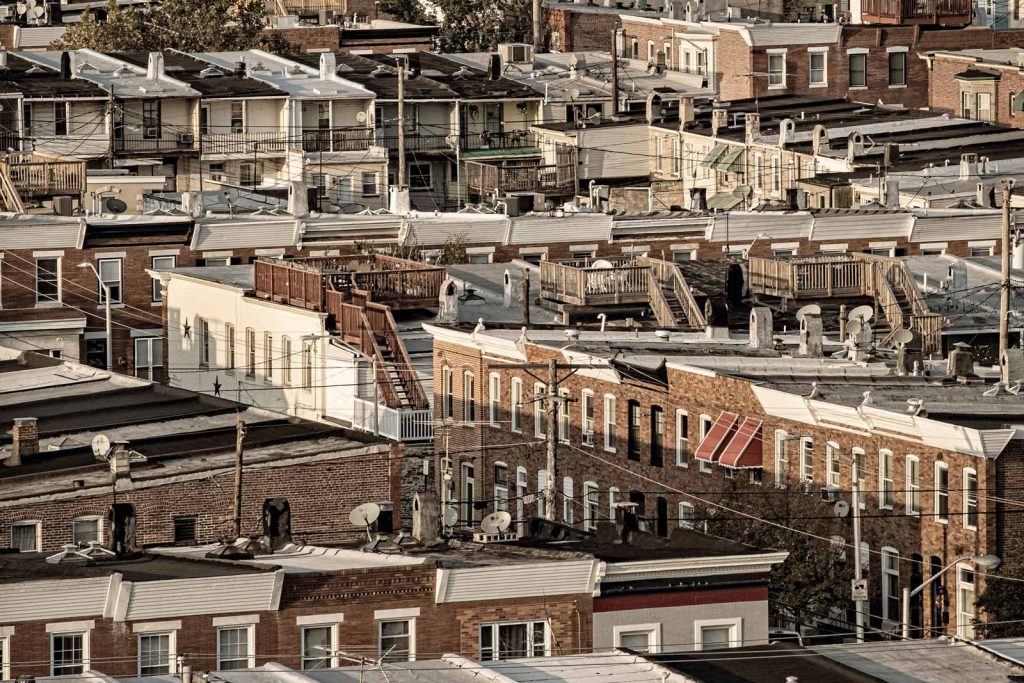
Under the Bill of Rights, the Sixth Amendment granted United States citizens the right “to have the Assistance of Counsel” in criminal prosecutions. No such protections were guaranteed for defendants in civil procedures. Millions of people end up representing themselves pro se in housing, family and immigration courts, as well as in other civil legal matters.
This problem is especially acute in eviction courts, where renters are largely left to their own devices and forced to rely on their own limited understanding of landlord/tenant law. The National Coalition for a Civil Right to Counsel reports that disadvantaged tenants show up for eviction appearances alone and unprepared, while upwards of 90 percent of landlords arrive with legal representation. A 2020 study by the Eviction Research Network showed that Baltimore City, alone, had an eviction rate over two times higher than the national rate.
“Eviction is not a symptom of poverty, it is a cause of poverty,” says Neha Lall, Professor of the Practice and director of externships at The University of Baltimore School of Law, citing the work of Pulitzer Prize winning author and social scientist Matthew Desmond, founder of the Eviction Lab. “When a person is evicted from their home for as little as being five dollars short on rent, the dislocation that occurs is incredibly disruptive to their employment, to their children’s education, to family stability generally. And there really isn’t any social safety net around this.”
“Public interest lawyers have saved lives, protected fundamental rights, established crucial principles, transformed institutions, and ensured essential benefits for those who need them most. …In virtually every major American social reform movement of the last half century, public interest lawyers have played an important role.”
— DEBORAH RHODE
JURIST, LEGAL SCHOLAR AND FORMER ERNEST W. MCFARLAND PROFESSOR OF LAW, STANFORD LAW SCHOOL
In 2020, the COVID-19 pandemic triggered an affordable housing crisis. This, coupled with mass unemployment, threatened to send the nation’s already high eviction numbers over the brink. Recognizing the desperate need for action, on May 30, 2021, Maryland became only the second state in the country to grant income-eligible citizens the “access to counsel” in civil evictions, by enacting the Access to Counsel in Evictions (ACE) Program. Additionally, Maryland enacted a requirement that landlords provide written notice to tenants alerting them they have 10 days to pay the owed amount before legal proceedings are initiated and inform them of legal assistance and financial support resources.
While the ACE Program is an important step in mitigating a significant social inequity, its success relies heavily on whether there are enough qualified attorneys to assist renters, and that renters are able to access the help. Students and professors committed to public interest work in the School of Law’s experiential program are actively working to train future attorneys to meet this need.
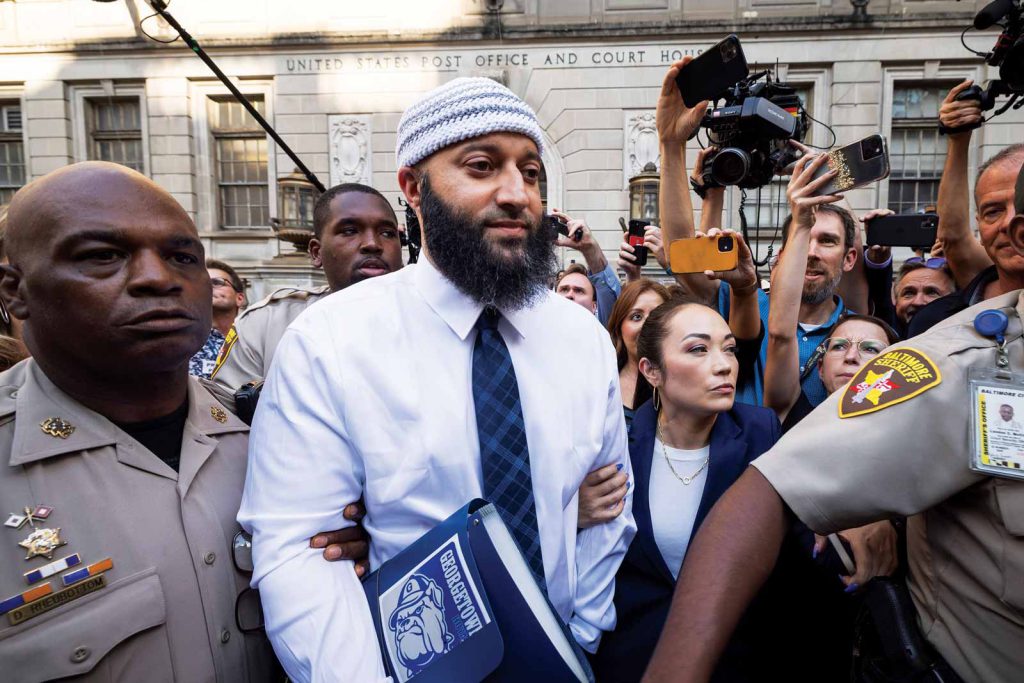
“Instead of trying to get a pot of money for the University of Baltimore to just take on a handful of eviction cases in Baltimore City, we decided it would be a better use of our resources and our educational mission to apply for grant funds to pay our students to do placements at agencies across the state already working on implementation of the law,” Lall explains.
After its first year, the University of Baltimore School of Law Housing Justice Fellowship Program has placed 16 law students at legal aid organizations thanks to funding from Maryland Legal Services Corporation, and the University has created a housing justice course as well.
These are important steps toward ACE’s implementation and also help to solve a burgeoning hiring crisis by training attorneys who can fill the demand for services. While there is now funding for those in need to have counsel, there are few attorneys trained in eviction representation. “Our hope is that over time, this will help create a pipeline of graduates who are qualified to take on these cases and passionate about housing justice,” says Lall.
“You ultimately judge the civility of a society not by how it treats the rich, the powerful, the protected and the highly esteemed, but by how it treats the poor, the disfavored and the disadvantaged.”
BRYAN STEVENSON
AUTHOR, ACTIVIST AND ARONSON FAMILY PROFESSOR OF CRIMINAL JUSTICE, NEW YORK UNIVERSITY SCHOOL OF LAW
The ACE program is a prime example of how the School of Law has put its commitment to public interest law into practice, and one of many ways the University of Baltimore plays an essential role in supporting equitable access to justice. During the last academic year, 73 students received externship credit to work in public service. Collectively, they conducted more than 11,000 hours of work at nonprofit and government placements including with criminal prosecutors, public defenders, the Public Justice Center, Kids in Need of Defense, Tahirih Justice Center and the Human Trafficking Prevention Project.
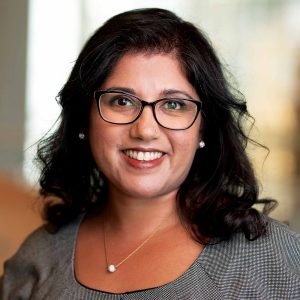
Externships, which place students in workplaces outside of the law school, are one key component of the experiential learning program at UBalt Law. The other main component is the in-house clinical program. Each year, the clinical program teaches ap-proximately 150 students how to practice law as “first-chair” attorneys—not as researchers or law clerks, but as lead counsel for their clients—in important areas of need: veterans advocacy, family mediation, mental health law and immigrant justice, to name but a few.
In essence, UBalt’s clinical program functions as a large public interest law firm housed within the law school, with dual educational and community service missions, and is perhaps one of the largest providers of pro bono legal services in the state after the Maryland Legal Aid Bureau. Through the clinics, students are licensed to practice law under a special court rule since they receive intense educational support from law school faculty, enabling them to represent and advocate on behalf of underserved populations at the community level and argue for systemic change at the state and even federal level.
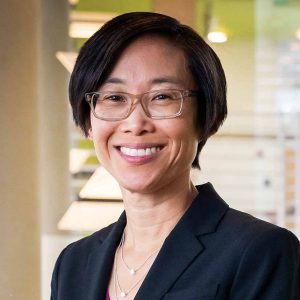
The school’s program of 12 law clinics is one of the most highly regarded in the country, currently ranked eighth in the nation by U.S. News & World Report thanks, in part, to the school’s commitment to having it run by tenured professors, which is unusual among programs of its kind and demonstrates UBalt’s strong commitment to top-notch experiential education.
“There’s such a deep and wide need for legal services, and they’re incredibly expensive, so there’s not enough expertise to serve all the people in need,” explains Jaime Alison Lee, associate dean for experiential education at the law school, professor of law, and director of the Community Development Clinic. A recent “Justice Gap Report” from the Legal Services Corporation bears this out, noting that for 93 percent of the civil legal problems reported, low-income Americans received inadequate or no legal help.
Lee explains that, as part of an educational institution, the clinical program chooses not to take on a huge caseload similar to what an entity like Legal Aid might. Instead, “we tend to take on difficult cases, ones that really need a lot of attention,” so that students can learn deeply and intensively from their experiences.
Some of the most difficult are tackled through the Innocence Project Clinic (IPC). Led by director and Professor of the Practice Erica J. Suter, student attorneys provide legal support for defendants who maintain their innocence in criminal cases. In addition to the well-known exoneration of Adnan Syed last year, the work of UBalt students has resulted in the release of multiple clients, who collectively served over 75 years in prison. Under Maryland’s Juvenile Restoration Act, those convicted of a crime as minors who have served over 20 years in prison, can now work with the IPC (and in conjunction with the Office of the Public Defender) to file a motion to reduce their sentences.
While these types of criminal cases may be more high-profile, the majority of the workload in the clinical program focuses on a wide spectrum of civil issues.
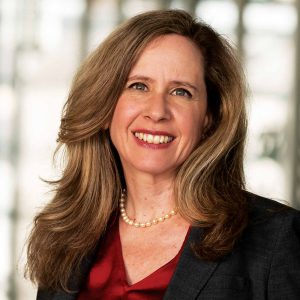
Susan Francis, J.D. ’11, is the executive director of Maryland Volunteer Lawyer Service (MVLS), a nonprofit founded in 1981 to connect volunteer lawyers to low-income individuals in need of representation due to the lack of right to counsel in civil matters. She says the staff at MVLS starts making their “wish list” in February in expectation of the arrival of summer interns from UBalt. While student externs and interns do not practice law as they do under the auspices of a clinic, Francis says they work directly with clients on legal matters. They also play an essential role in community outreach and education.
“Outside of Law & Order, there’s huge confusion about what the law does, and even more so when you are working with those who are least resourced,” she says. MVLS produces fact sheets and articles, written in plain language, that go directly into the hands of those in need so they are informed on the law and their rights. Much of that material is written by UBalt students.
“The nice thing about that is, we work with a lot of community partners who are the knowledge bearers in their community,” says Francis. “When we put that in the hands of one person in the community, they talk to their neighbors, and they talk to their families, and they talk to their friends. All that knowledge in the community, and our students have a lot to do with that.”
Externs also work at the Pro Bono Resource Center of Maryland (PBRC), which provides civil legal assistance to low-income residents, particularly in the area of housing. Melissa Chiasera, managing attorney at the Courtroom Advocacy Project at PBRC, says externs from UBalt work directly with clients in rent court clinics and play an essential role answering questions on PBRC’s Tenant and Consumer Hotline.
“Having students work these shifts frees up staff attorney time while offering callers more personal attention and an opportunity to have their issue heard,” Chiasera explains.
Michele Gilman, Venable Professor of Law, directs the Saul Ewing Civil Advocacy Clinic. Because this is a general practice clinic, students see diverse cases. They may represent anyone from a consumer wronged by a retailer or suffering from collection of a debt against them, to people whose public benefits have been cut off or workers who haven’t been paid their full wages. Gilman says without these student lawyers, hundreds of people would go without representation every year.
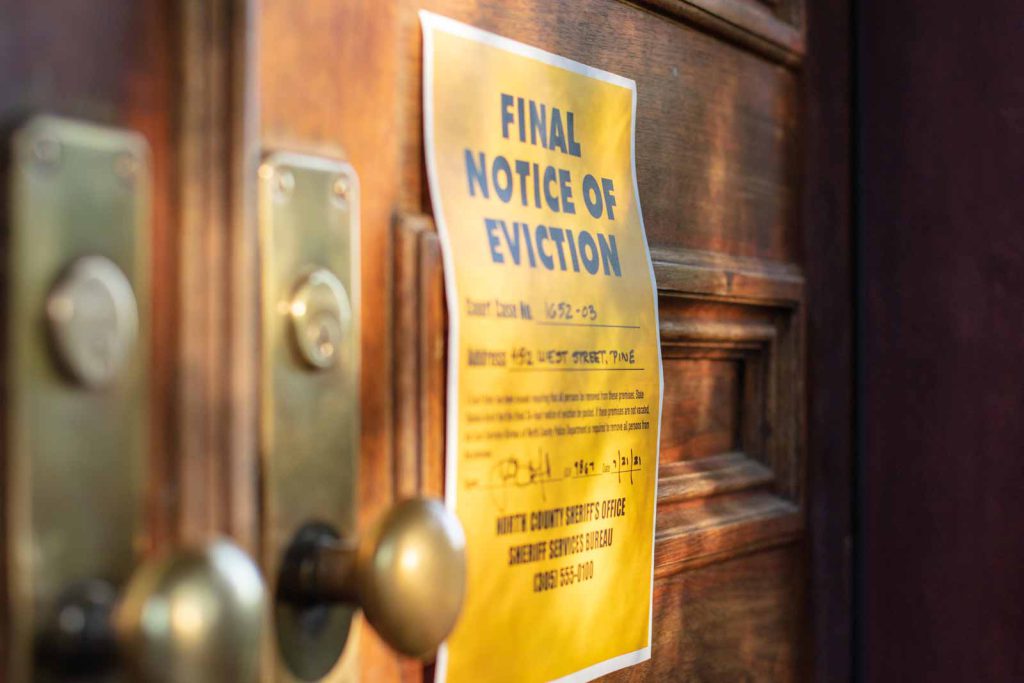
“This results in their legal rights not being effectu-ated,” says Gilman. “And sometimes they end up being exploited by more powerful entities. It reinforces the power imbalances in our society when people aren’t able to advocate effectively for their legal rights.”
Annamaria M. Walsh, J.D. ’93, director of the Alternative Dispute Resolution Division of the Appellate Court of Maryland, receives student attorneys from the Mediation Clinic for Families, which offers representation on matters such as child custody and visitation and divorce. She says most of the clients that the clinic assists would otherwise not have access to mediation in the court.
“[Cases] would simply move forward in the appel-late process without settlement discussions,” says Walsh. “Even if the case doesn’t settle, the legal advice and information that the clinic provides to the parties they represent can be invaluable, especially to parents who are considering their future child access actions.”
While clinical work such as this might be gratifying for law school students, the impact goes far beyond their own professional development. They also play an important role in community development as they work to enact systemic change by examining the laws affecting their clients adversely and working to alter them to provide more equitable justice.
“We educated, privileged lawyers have a professional and moral duty to represent the underrepresented in our society, to ensure that justice exists for all, both legal and economic justice.”
SONIA SOTOMAYOR
ASSOCIATE JUSTICE OF THE SUPREME COURT OF THE UNITED STATES
“We do individual client representation, which addresses the legal concerns of each person, but in addition, all our clinics also focus on addressing the systemic issues that generate problems for individuals in the first place,” says Lee. “We have an obligation and a commitment to not just fighting every little fire individually, but to improving the systems that we have more broadly.”
According to Lee, legislative work can take many different forms, from representing an organization that is advocating for a law or policy reform that could otherwise not afford an attorney to testifying in Annapolis for specific pieces of legislation.
This is an area Lee is familiar with in her own work. In 2020, the Baltimore City Council advanced an implementation timeline for the Water Accountability & Equity Act, a measure that improves access to affordable water and that Lee’s Community Development Clinic advocated for in partnership with the Baltimore Right to Water Coalition. In another instance, Gilman’s students testified in support of a recently passed bill that will assist those receiving SNAP benefits who have been victimized by EBT card theft.
“I do think the law school can play a unique role when our students are testifying before the General Assembly, because our testimony is based on our legal research, our policy analysis, and we are able to bring an objective evaluation of the situation to the table that I believe delegates and senators find very helpful,” says Gilman.
For Francis, for whom law was a second career, her experience in the Civil Advocacy Clinic was “the missing piece” that brought together legal theory and practical applications and set her on a public interest law career trajectory. As a clinic student-attorney, Francis argued an unemployment claim for a client who would otherwise have had no assistance navigating that complicated system and also testified in Annapolis on landlord-tenant issues.
“In clinic, I did direct representation, but also looked more broadly at whether the system was actually working or not working, especially for individuals that are least resourced,” she says. “It set me up perfectly to take all those lessons and work them into the services MVLS provides the community.” Lee notes that not all students can or will follow a career in public interest law, but in addition to the results of their clinical work, perhaps the most comprehensive impact that public-facing legal advocacy has on the wider populace is how it fills the pipeline with community-minded lawyers.
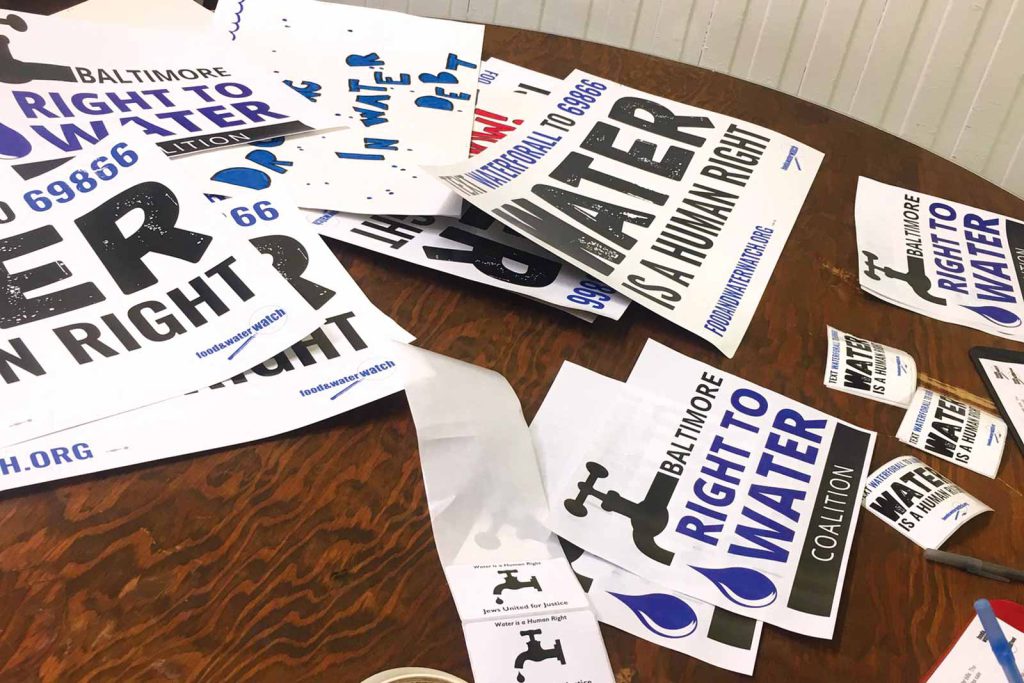
This is particularly relevant as the clinic program’s “ethos of lawyering,” as Lee calls it, embraces client-centeredness, shifting power—and interest—back to the client as a human being. Not only are lawyers encouraged to engage their clients in discourse to better understand their goals and create legal strategies with the client at the fore, but they’re encouraged to openly share their knowledge of the law, thus making it more accessible and empowering the public to better engage in their own legal decision-making.
“The exposure to clients, to this kind of work, and to broader systemic issues is eye-opening for a lot of students,” says Lee. “We spend a lot of time in the clinical courses not just teaching the skill of writing a motion or doing an opening argument; we put it within the context of what a lawyer contributes to society and the work they can do to effect change.
Baltimore-based writer Christianna McCausland is a regular contributor to the magazine.
